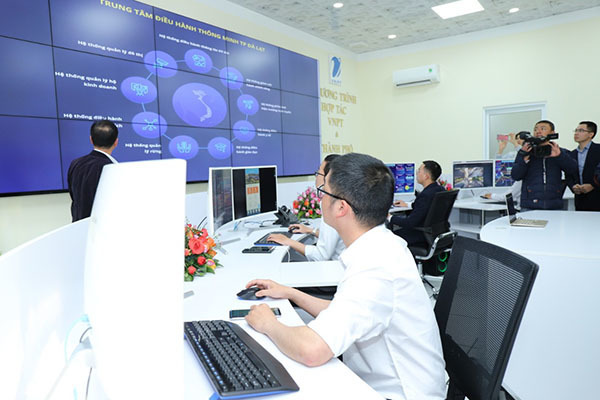Vietnam issues first e-government development strategy towards digital government
2021/06/17
On June 15, 2021, the Prime Minister issued Decision No. 942/QD-TTg approving the e-government development strategy towards the digital government in the 2021-2025 period, with a vision to 2030.
This is the very first time that Vietnam has issued a strategy on developing e-government and moving towards the digital government.

The strategy sets out a vision to 2030 that Vietnam would be ranked among the top 30 countries in the world
in terms of e-government and digital government according to the United Nations ranking. (Illustrative photo).
The e-government development strategy towards the digital government in the 2021-2025 period, with an orientation to 2030, is consistent with the directions and orientations of the Party and State for socio-economic growth in the Fourth Industrial Revolution (Resolution No. 52-NQ/TW dated September 27, 2019, by the Politburo; Resolution No. 50/NQ-CP dated April 17, 2020, by the Government); consistent with the National Digital Transformation Program approved in Decision No. 749/QD-TTg dated June 3, 2020, by the Prime Minister; consistent with the National Strategy on the Fourth Industrial Revolution to 2030, issued in Decision No. 2289/QD-TTg dated December 31, 2020, by the Prime Minister. Furthermore, the strategy is also in line with the Government's Resolution No. 136/NQ-CP dated September 25, 2020, on sustainable development; in line with the new trend of digital government development mentioned in the 2020 United Nations E-Government Survey with the theme of "Digital Government in the Decade of Action for Sustainable Development".
Six major viewpoints have been highlighted in the strategy, which serves as directions and orientations for the development of the digital government, as well as the digital economy and society in the new period. The first and most important among them is: Developing a Digital Government with all safe operations in the digital environment, a redesigned operating model, and operations based on data and digital technology, in order to deliver better quality services, make more timely decisions, formulate better policies, use resources more optimally, facilitate development, lead the country's digital transformation, effectively address major problems in socio-economic development and management.
The strategy sets out a vision to 2030 that Vietnam would be ranked among the top 30 countries in the world in terms of e-government and digital government according to the United Nations ranking.
It also identifies five key target groups, including: Providing high-quality services to society; Broadening public engagement; Improving state agency operations; Effectively addressing important issues in socioeconomic growth; Having a breakthrough change in the national ranking for e-government, digital government, e-participation and open data as assessed by the United Nations.
To realize these targets, the strategy has identified 06 groups of national key tasks (improving the legal environment; developing digital infrastructure (cloud-first); developing digital platforms and national-scale systems; developing national digital data; developing national applications and services; ensuring the safety and security of the national network); 06 groups of corresponding tasks within the scope of ministries and local industries, which emphasizes: Developing online public services based on people's needs and life events, in which people only need to provide information once. Some of the core tasks include:
- Amending the Law on Electronic Transactions and the Law on Archives; Formulating the Law on Digital Government; Promulgating the Government's Decree on electronic identification and authentication and completing the legal corridor to popularize digital identities; Ensuring a regulatory environment that allows experimentation, acceptance of innovation and change;
- Developing and operating specialized network infrastructure stably, safely, and smoothly, connecting 04 administrative levels from central to commune level; Building a Government cloud computing platform; Developing the National Data Sharing and Integration Platform; Developing the National Electronic Authentication and Identity Exchange Platform; Developing Application Platforms on mobile devices for all e-government and digital government services;
- Developing national databases, in which prioritizing national databases on population, land, and enterprises; developing specialized data on finance, insurance, agriculture, education, health, employment, and social security...
- Developing and completing the National Public Service Portal; building the National Data Portal; building an online meeting platform, a platform for working and collaborating on the digital environment, a virtual assistant platform; developing and completing the government reporting information system; developing the National Document Communication Axis; developing the national bidding network system; Building the State Budget and Accounting Information System.
- Building a support system for monitoring and operating safety and network security in service of e-government; Building a system for analyzing and processing big data to serve the task of ensuring national cybersecurity; Building a support system for coordination and response to cybersecurity incidents; Developing and perfecting the Government's specialized digital signature authentication system.
The strategy also outlines the roles and responsibilities of ministries, industries, and local governments in leveraging new digital technologies such as Cloud Computing, Big Data, Mobility, Internet of Things (IoT), Artificial Intelligence (AI), Blockchain, social media, ... to save time and costs of building and operating information systems and automating, intelligentizing, and optimizing work processes.
Vietnam's e-government development strategy towards the digital government in the 2021-2025 period, with a vision to 2030 shall undoubtedly create a breakthrough in the development of e-government and digital government in the new period, contributing to the successful implementation of Vietnam's digital transformation goals, which are based on three pillars of Digital Government, Digital Economy, and Digital Society; in line with the development trend of the world.
Van Anh
Reference: https://vietnamnet.vn/en/sci-tech-environment/vietnam-issues-first-e-government-development-strategy-towards-digital-government-746191.html
